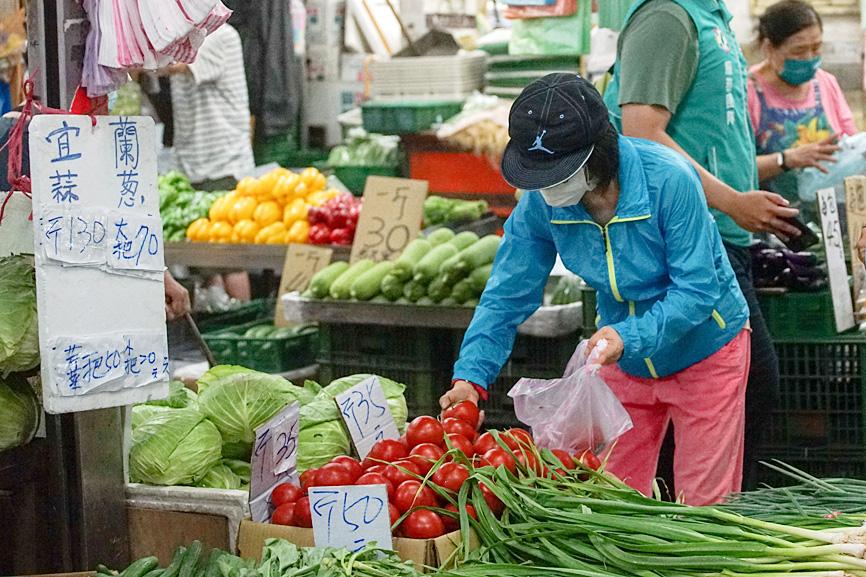The Directorate-General of Budget, Accounting and Statistics (DGBAS) yesterday trimmed its forecast for the nation’s economic growth to 3.76 percent from an estimate of 3.91 percent in May, given slowing global trade and weaker export momentum.
It is the second time that DGBAS cut its prediction, after it lowered the figure to 3.85 percent last month. The 0.15 percentage point revision brings the forecast lower than those estimated by most think tanks.
“We have a mild revision because we found that most sectors still report stable growth rather than a drastic correction,” DGBAS Minister Chu Tzer-ming (朱澤民) told a news conference in Taipei.

Photo: CNA
Slower demand for exports is the main reason for the revision, as the IMF had cut its forecast for global trade growth this year to 4.1 percent from five percent given surging inflation, the war in Ukraine war and tightened monetary measures, Chu said.
The agency cut its forecast for the nation’s exports to US$506.7 billion for this year, compared with an earlier estimate of US$516.1 billion.
However, the revised export figures still represent annual growth of 13.51 percent, Chu said.
Imports are forecast to grow faster than exports, by 16.8 percent annually to US$445.6 billion, as domestic manufacturers have significant demand for foreign-made machinery, DGBAS Statistics Department head Tsai Yu-tai (蔡鈺泰) said.
Trade surplus in goods and services is expected to book US$114.1 billion, down from US$115.1 billion last year, the agency said.
As a result, net demand from foreign markets is predicted to contribute 0.85 percentage points to GDP growth, down from 1.85 percent last year and 2.67 percent in 2020, Tsai said.
However, DGBAS boosted its growth forecast for domestic investment to 6.55 percent for the year, up by nearly 2 percentage points from an earlier estimate, as the agency had seen stronger-than-expected momentum, especially from semiconductor companies, offshore wind power developers and solar power farmers, Tsai said.
The agency expects private consumption to peak this quarter, up 6.49 percent year-on-year, given relaxed COVID-19 measures and government programs to spur local travel, Tsai said.
Private consumption this year is expected to rise 3.03 percent from a year earlier, the first annual growth since 2020, the DGBAS said.
The DGBAS yesterday raised this year’s consumer price index growth forecast to 2.92 percent, up from the 2.67 percent it estimated in May, mainly because of a surge in the costs of rental homes and dining out, Chu said.
If accurate, 2.92 percent would be the highest growth since 2009, after 3.52 percent in 2008, Tsai said.
Asked why DGBAS did not raise the figure above three percentage points, as most think tanks had estimated, Chu said that international prices of goods slid month-on-month, and “the second quarter should have been the peak for inflation growth.”

South Korea’s equity benchmark yesterday crossed a new milestone just a month after surpassing the once-unthinkable 5,000 mark as surging global memory demand powers the country’s biggest chipmakers. The KOSPI advanced as much as 2.6 percent to a record 6,123, with Samsung Electronics Co and SK Hynix Inc each gaining more than 2 percent. With the benchmark now up 45 percent this year, South Korea’s stock market capitalization has also moved past France’s, following last month’s overtaking of Germany’s. Long overlooked by foreign funds, despite being undervalued, South Korean stocks have now emerged as clear winners in the global market. The so-called “artificial intelligence

‘SEISMIC SHIFT’: The researcher forecast there would be about 1.1 billion mobile shipments this year, down from 1.26 billion the prior year and erasing years of gains The global smartphone market is expected to contract 12.9 percent this year due to the unprecedented memorychip shortage, marking “a crisis like no other,” researcher International Data Corp (IDC) said. The new forecast, a dramatic revision down from earlier estimates, gives the latest accounting of the ongoing memory crunch that is affecting every corner of the electronics industry. The demand for advanced memory to power artificial intelligence (AI) tasks has drained global supply until well into next year and jeopardizes the business model of many smartphone makers. IDC forecast about 1.1 billion mobile shipments this year, down from 1.26 billion the prior

People stand in a Pokemon store in Tokyo on Thursday. One of the world highest-grossing franchises is celebrated its 30th anniversary yesterday.

Chinese artificial intelligence (AI) start-up DeepSeek’s (深度求索) latest AI model, set to be released as soon as next week, was trained on Nvidia Corp’s most advanced AI chip, the Blackwell, a senior official of US President Donald Trump’s administration said on Monday, in what could represent a violation of US export controls. The US believes DeepSeek will remove the technical indicators that might reveal its use of American AI chips, the official said, adding that the Blackwells are likely clustered at its data center in Inner Mongolia, an autonomous region of China. The person declined to say how the US government received